- Home
- Sherry Thomas
Ravishing the Heiress ft-2
Ravishing the Heiress ft-2 Read online
Ravishing the Heiress
( Fitzhugh Trilogy - 2 )
Sherry Thomas
Millicent understands the terms of her arranged marriage all too well. She gets to be a Countess by marrying an impoverished Earl. And in return, the Earl Fitzhugh receives the benefit of her vast wealth, saving his family from bankruptcy. Because of her youth, they have agreed to wait eight years before consummating the marriage--and then, only to beget an heir. After which, they will lead separate lives.
It is a most sensible arrangement. Except for one little thing. Somehow Millie has fallen head over heels in love with her husband. Her husband, who has become her very best friend, but nothing more...Her husband, who plans to reunite with his childhood sweetheart, the beautiful and newly widowed Isabella, as soon as he has honored the pact with his wife...
As the hour they truly become husband-and-wife draws near, both Millie and Fitzhugh must face the truth in their hearts. Has their pact bred only a great friendship--or has it, without either of them quite noticing, given rise to a great love?
Sherry Thomas
Ravishing the Heiress
Fitzhugh Trilogy - 2
To my husband, the one with whom I have built my life
ACKNOWLEDGMENTS
To everyone who helped me in the writing of this book and everyone who helped me in arriving at this moment in my life.
CHAPTER 1
Fate
1888
I t was love at first sight.
Not that there was anything wrong with love at first sight, but Millicent Graves had not been raised to fall in love at all, let alone hard and fast.
She was the only surviving child of a very prosperous man who manufactured tinned goods and other preserved edibles. It had been decided, long before she could comprehend such things, that she was going to Marry Well—that via her person, the family’s fortune would be united with an ancient and illustrious title.
Millie’s childhood had therefore consisted of endless lessons: music, drawing, penmanship, elocution, deportment, and, when there was time left, modern languages. At ten, she successfully floated down a long flight of stairs with three books on her head. By twelve, she could exchange hours of pleasantries in French, Italian, and German. And on the day of her fourteenth birthday, Millie, not at all a natural musician, at last conquered Listz’s Douze Grandes Études, by dint of sheer effort and determination.
That same year, with her father coming to the conclusion that she would never be a great beauty, nor indeed a beauty of any kind, the search began for a highborn groom desperate enough to marry a girl whose family wealth derived from—heaven forbid—sardines.
The search came to an end twenty months later. Mr. Graves was not particularly thrilled with the choice, as the earl who agreed to take his daughter in exchange for his money had a title that was neither particularly ancient nor particularly illustrious. But the stigma attached to tinned sardines was such that even this earl demanded Mr. Graves’s last penny.
And then, after months of haggling, after all the agreements had finally been drawn up and signed, the earl had the inconsideration to drop dead at the age of thirty-three. Or rather, Mr. Graves viewed his death a thoughtless affront. Millie, in the privacy of her room, wept.
She’d seen the earl only twice and had not been overjoyed with either his anemic looks or his dour temperament. But he, in his way, had had as little choice as she. The estate had come to him in terrible disrepair. His schemes of improvement had made little to no difference. And when he’d tried to land an heiress of a more exalted background, he’d failed resoundingly, likely because he’d been so unimpressive in both appearance and demeanor.
A more spirited girl might have rebelled against such an unprepossessing groom, seventeen years her elder. A more enterprising girl might have persuaded her parents to let her take her chances on the matrimonial mart. Millie was not either of those girls.
She was a quiet, serious child who understood instinctively that much was expected of her. And while it was desirable that she could play all twelve of the Grandes Études rather than just eleven, in the end her training was not about music—or languages, or deportment—but about discipline, control, and self-denial.
Love was never a consideration. Her opinions were never a consideration. Best that she remained detached from the process, for she was but a cog in the great machinery of Marrying Well.
That night, however, she sobbed for this man, who, like her, had no say in the direction of his own life.
But the great machinery of Marrying Well ground on. Two weeks after the late Earl Fitzhugh’s funeral, the Graves hosted his distant cousin the new Earl Fitzhugh for dinner.
Millie knew very little of the late earl. She knew even less of the new one, except that he was only nineteen, still in his last year at Eton. His youth disturbed her somewhat—she’d been prepared to marry an older man, not someone close to her own age. But other than that, she dwelled on him not at all: Her marriage was a business transaction; the less personal involvement from her, the more smoothly things would run.
Unfortunately, her indifference—and her peace of mind—came to an abrupt end the moment the new earl walked in the door.
M illie was not without thoughts of her own. She very carefully watched what she said and did, but seldom censored her mind: It was the only freedom she had.
Sometimes, as she lay in bed at night, she thought of falling in love, in the ways of a Jane Austen novel—her mother did not allow her to read the Brontës. Love, it seemed to her, was a result born of careful, shrewd observation. Miss Elizabeth Bennet, for example, did not truly consider Mr. Darcy to have the makings of a fine husband until she had seen the majesty of Pemberley, which stood for Mr. Darcy’s equally majestic character.
Millie imagined herself a wealthy, independent widow, inspecting the gentlemen available to her with wry but humane wit. And if she were fortunate enough, finding that one gentleman of character, sense, and good humor.
That seemed to her the epitome of romantic love: the quiet satisfaction of two kindred souls brought together in gentle harmony.
She was, therefore, entirely unprepared for her internal upheaval, when the new Earl Fitzhugh was shown into the family drawing room. Like a visitation of angels, there flared a bright white light in the center of her vision. Haloed by this supernatural radiance stood a young man who must have folded his wings just that moment so as to bear a passing resemblance to a mortal.
An instinctive sense of self-preservation made her lower her face before she’d quite comprehended the geography of his features. But she was all agitation inside, a sensation that was equal parts glee and misery.
Surely a mistake had been made. The late earl could not possibly have a cousin who looked like this. Any moment now he’d be introduced as the new earl’s schoolmate, or perhaps the guardian Colonel Clements’s son.
“Millie,” said her mother, “let me present Lord Fitzhugh. Lord Fitzhugh, my daughter.”
Dear God, it was him. This mind-bogglingly handsome young man was the new Lord Fitzhugh.
She had to lift her eyes. Lord Fitzhugh returned a steady, blue gaze. They shook hands.
“Miss Graves,” he said.
Her heart thrashed drunkenly. She was not accustomed to such complete and undiluted masculine attention. Her mother was attentive and solicitous. But her father only ever spoke to her with one eye still on his newspaper.
Lord Fitzhugh, however, was focused entirely on her, as if she were the most important person he’d ever met.
“My lord,” she murmured, acutely aware of the warmth on her face and the old-master perfection of his cheekbones.
Dinner was announced
on the heels of the introductions. The earl offered his arm to Mrs. Graves and it was with great envy that Millie took Colonel Clements’s arm.
She glanced at the earl. He happened to be looking her way. Their eyes held for a moment.
Heat pumped through her veins. She was jittery, stunned almost.
What was the matter with her? Millicent Graves, milquetoast extraordinaire, through whose veins dripped the lack of passion, did not experience such strange flashes and flutters. She’d never even read a Brontë novel, for goodness’ sake. Why did she suddenly feel like one of the younger Bennet girls, the ones who giggled and shrieked and had absolutely no control over themselves?
Distantly she realized that she knew nothing of the earl’s character, sense, or temperament. That she was behaving in a shallow and foolish manner, putting the cart before the horse. But the chaos inside her had a life and a will of its own.
As they entered the dining room, Mrs. Clements said, “What a lovely table. Don’t you agree, Fitz?”
“I do,” said the earl.
His name was George Edward Arthur Granville Fitzhugh—the family name and the title were the same. But apparently those who knew him well called him Fitz.
Fitz, her lips and teeth played with the syllable. Fitz.
At dinner, the earl let Colonel Clements and Mrs. Graves carry the majority of the conversation. Was he shy? Did he still obey the tenet that children should be seen and not heard? Or was he using the opportunity to assess his possible future in-laws—and his possible future wife?
Except he didn’t appear to be studying her. Not that he could do so easily: A three-tier, seven-branch silver epergne, sprouting orchids, lilies, and tulips from every appendage, blocked the direct line of sight between them.
Through petals and stalks, she could make out his occasional smiles—each of which made her ears hot—directed at Mrs. Graves to his left. But he looked more often in her father’s direction.
Her grandfather and her uncle had built the Graves fortune. Her father had been young enough, when the family coffer began to fill, to be sent to Harrow. He’d acquired the expected accent, but his natural temperament was too lackluster to quite emanate the gloss of sophistication his family had hoped for.
There he sat, at the head of the table, neither a ruthless risk taker like his late father, nor a charismatic, calculating entrepreneur like his late brother, but a bureaucrat, a caretaker of the riches and assets thrust upon him. Hardly the most exciting of men.
Yet he commanded the earl’s attention this night.
Behind him on the wall hung a large mirror in an ornate frame, which faithfully reflected the company at table. Millie sometimes looked into that mirror and pretended she was an outside observer documenting the intimate particulars of a private meal. But tonight she had yet to give the mirror a glance, since the earl sat at the opposite end of the table, next to her mother.
She found him in the mirror. Their eyes met.
He had not been looking at her father. Via the mirror, he’d been looking at her.
Mrs. Graves had been forthcoming on the mysteries of marriage—she did not want Millie ambushed by the facts of life. The reality of what happened between a man and a woman behind closed doors usually had Millie regard members of the opposite sex with wariness. But his attention caused only fireworks inside her—detonations of thrill, blasts of full-fledged happiness.
If they were married, and if they were alone…
She flushed.
But she already knew: She would not mind it.
Not with him.
T he gentlemen had barely rejoined the ladies in the drawing room when Mrs. Graves announced that Millie would play for the gathering.
“Millicent is splendidly accomplished at the pianoforte,” she said.
For once, Millie was excited about the prospect of displaying her skills—she might lack true musicality, but she did possess an ironclad technique.
As Millie settled herself before the piano, Mrs. Graves turned to Lord Fitzhugh. “Do you enjoy music, sir?”
“I do, most assuredly,” he answered. “May I be of some use to Miss Graves? Turn the pages for her perhaps?”
Millie braced her hand on the music rack. The bench was not very long. He’d be sitting right next to her.
“Please do,” said Mrs. Graves.
And just like that, Lord Fitzhugh was at Millie’s side, so close that his trousers brushed the flounces of her skirts. He smelled fresh and brisk, like an afternoon in the country. And the smile on his face as he murmured his gratitude distracted her so much that she forgot that she should be the one to thank him.
He looked away from her to the score on the music rack. “Moonlight Sonata. Do you have something lengthier?”
The question rattled—and pleased—her. “Usually one only hears the first movement of the sonata, the adagio sostenuto. But there are two additional movements. I can keep playing, if you’d like.”
“I’d be much obliged.”
A good thing she played mechanically and largely from memory, for she could not concentrate on the notes at all. The tips of his fingers rested lightly against a corner of the score sheet. He had lovely looking hands, strong and elegant. She imagined one of his hands gripped around a cricket ball—it had been mentioned at dinner that he played for the school team. The ball he bowled would be fast as lightning. It would knock over a wicket directly and dismiss the batsman, to the roar of the crowd’s appreciation.
“I have a request, Miss Graves,” he spoke very quietly.
With her playing, no one could hear him but her.
“Yes, my lord?”
“I’d like you to keep playing no matter what I say.”
Her heart skipped a beat. Now it was beginning to make sense. He wanted to sit next to her so that they could hold a private conversation in a room full of their elders.
“All right. I’ll keep going,” she answered. “What is it that you want to say, sir?”
“I’d like to know, Miss Graves, are you being forced into marriage?”
Ten thousand hours before the pianoforte was the only thing that kept Millie from coming to an abrupt halt. Her fingers continued to pressure the correct keys; notes of various descriptions kept on sprouting. But it could have been someone in the next house playing, so dimly did the music register.
“Do I—do I give the impression of being forced, sir?” Even her voice didn’t quite sound her own.
He hesitated slightly. “No, you do not.”
“Why do you ask, then?”
“You are sixteen.”
“It is far from unheard of for a girl to marry at sixteen.”
“To a man more than twice her age?”
“You make the late earl sound decrepit. He was a man in his prime.”
“I am sure there are thirty-three-year-old men who make sixteen-year-olds tremble in romantic yearning, but my cousin was not one of them.”
They were coming to the end of the page; he turned it just in time. She chanced a quick glance at him. He did not look at her.
“May I ask you a question, my lord?” she heard herself say.
“Please.”
“Are you being forced to marry me?”
The words left her in a spurt, like arterial bleeding. She was afraid of his answer. Only a man who was himself being forced would wonder whether she, too, was under the same duress.
He was silent for some time. “Do you not find this kind of arrangement exceptionally distasteful?”
Glee and misery—she’d been bouncing between the two wildly divergent emotions. But now there was only misery left, a sodden mass of it. His tone was courteous. Yet his question was an accusation of complicity: He would not be here if she hadn’t agreed.
“I—” She was playing the adagio sostenuto much too fast—no moonlight in her sonata, only storm-driven branches whacking at shutters. “I suppose I’ve had time to become inured to it: I’ve known my whole life that I’d have no sa
y in the matter.”
“My cousin held out for years,” said the earl. “He should have done it sooner: begotten an heir and left everything to his own son. We are barely related.”
He did not want to marry her, she thought dazedly, not in the very least.
This was nothing new. His predecessor had not wanted to marry her, either; she had accepted his reluctance as par for the course. Had never expected anything else, in fact. But the unwillingness of the young man next to her on the piano bench—it was as if she’d been forced to hold a block of ice in her bare hands, the chill turning into a black, burning pain.
And the mortification of it, to be so eager for someone who reciprocated none of her sentiments, who was revolted by the mere thought of taking her as a wife.
He turned the next page. “Do you never think to yourself, I won’t do it?”
“Of course I’ve thought of it,” she said, suddenly bitter after all these years of placid obedience. But she kept her voice smooth and uninflected. “And then I think a little further. Do I run away? My skills as a lady are not exactly valuable beyond the walls of this house. Do I advertise my services as a governess? I know nothing of children—nothing at all. Do I simply refuse and see whether my father loves me enough to not disown me? I’m not sure I have the courage to find out.”
He rubbed the corner of a page between his fingers. “How do you stand it?”
This time there was no undertone of accusation to his question. If she wanted to, she might even detect a bleak sympathy. Which only fed her misery, that foul beast with teeth like knives.
“I keep myself busy and do not think too deeply about it,” she said, in as harsh a tone as she’d ever allowed herself.
There, she was a mindless automaton who did as others instructed: getting up, going to sleep, and earning heaps of disdain from prospective husbands in between.
They said nothing more to each other, except to exchange the usual civilities at the end of her performance. Everyone applauded. Mrs. Clements said very nice things about Millie’s musicianship—which Millie barely heard.

_preview.jpg) Claiming the Duchess (Fitzhugh Trilogy Book 0.5)
Claiming the Duchess (Fitzhugh Trilogy Book 0.5)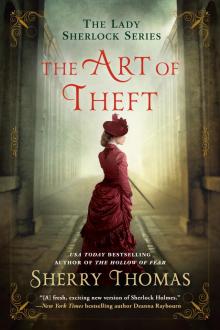 The Art of Theft
The Art of Theft The Magnolia Sword: A Ballad of Mulan
The Magnolia Sword: A Ballad of Mulan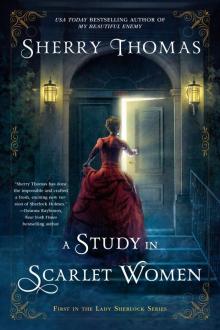 A Study In Scarlet Women
A Study In Scarlet Women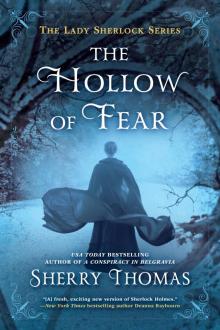 The Hollow of Fear
The Hollow of Fear The Magnolia Sword
The Magnolia Sword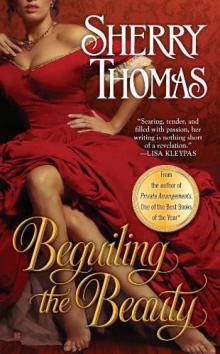 Beguiling the Beauty ft-1
Beguiling the Beauty ft-1 The Heart is a Universe
The Heart is a Universe The Hidden Blade: A Prequel to My Beautiful Enemy (Heart of Blade)
The Hidden Blade: A Prequel to My Beautiful Enemy (Heart of Blade)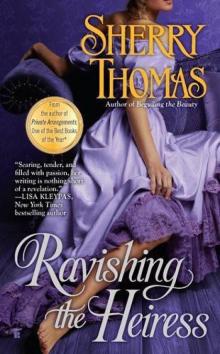 Ravishing the Heiress ft-2
Ravishing the Heiress ft-2 The Immortal Heights
The Immortal Heights The Hidden Blade
The Hidden Blade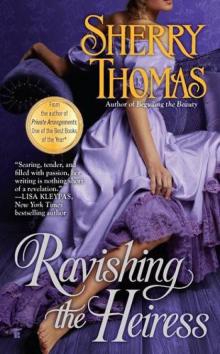 Ravishing the Heiress
Ravishing the Heiress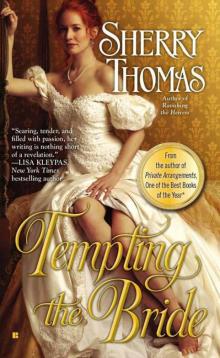 Tempting the Bride
Tempting the Bride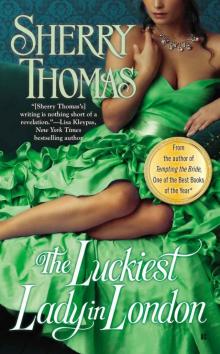 The Luckiest Lady in London
The Luckiest Lady in London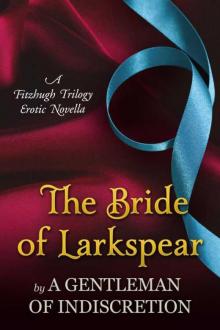 The Bride of Larkspear: A Fitzhugh Trilogy Erotic Novella
The Bride of Larkspear: A Fitzhugh Trilogy Erotic Novella Claiming the Duchess
Claiming the Duchess The One in My Heart
The One in My Heart His At Night
His At Night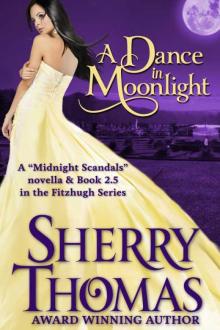 A Dance in Moonlight
A Dance in Moonlight A Conspiracy in Belgravia
A Conspiracy in Belgravia Not Quite a Husband
Not Quite a Husband